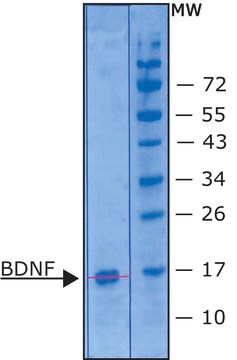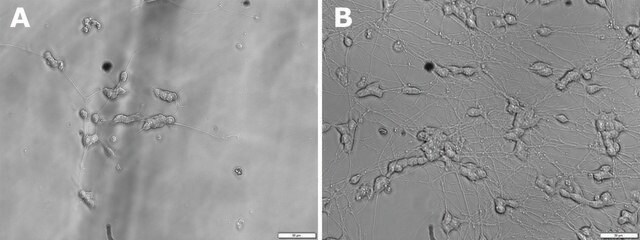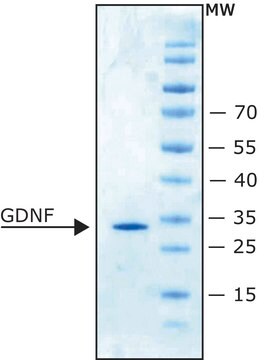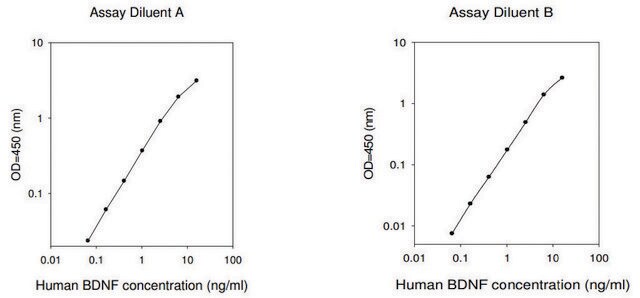SRP6053
ProBDNF human
recombinant, expressed in E. coli, ≥95% (SDS-PAGE), ≥95% (HPLC)
Sinónimos:
Abrineurin, BDNF, Brain-derived neurotrophic factor
Iniciar sesiónpara Ver la Fijación de precios por contrato y de la organización
About This Item
UNSPSC Code:
12352202
NACRES:
NA.32
Productos recomendados
Categorías relacionadas
General description
Brain-derived neurotrophic factor (BDNF) is a member of the neurotrophin family of growth factors. The precursor form of brain-derived neurotrophic factor (pro-BDNF) undergoes post-translational cleavage to form mature BDNF (mBDNF). The gene encoding this protein is localized on human chromosome 11p14.1.
Biochem/physiol Actions
Precursor form of brain-derived neurotrophic factor (pro-BDNF) interacts preferentially with the pan-neurotrophin receptor p75 (p75NTR) (2) and vps10p domain-containing receptor sortilin and induces neuronal apoptosis, whereas mature BDNF selectively binds with high affinity to the tropomyosin-related kinase B (TrkB) kinase receptor and promotes the survival, growth and differentiation of neurons. As proneurotrophins and mature neurotrophins elicit opposite biological effects, pro-BDNF cleavage in the neuronal system is regulated in a specific and cell-context dependent manner. Pro-BDNF plays important role in negative regulation of neurotrophic actions in the brain.
Physical form
Lyophilized from a 0.2 μm filtered solution of 20 mM PB and 250 mM NaCl, pH 7.2.
Preparation Note
Centrifuge the vial prior to opening.
Reconstitution
Dissolve in 1x PBS (It is not recommended to reconstitute to a final concentration less than 100 μg/mL.). This can further be diluted to other aqueous buffers.
Other Notes
Recombinant Human precursor form of Brain-derived neurotrophic factor produced in E. coli is a non-glycosylated polypeptide chain containing 2X229 amino acids as a homodimer and having a molecular mass of 52 kDa. The sequence of the first five N-terminal amino acids was determined and was found to be Ala-Pro-Met-Lys-Glu.
Storage Class
11 - Combustible Solids
wgk_germany
WGK 3
flash_point_f
Not applicable
flash_point_c
Not applicable
Certificados de análisis (COA)
Busque Certificados de análisis (COA) introduciendo el número de lote del producto. Los números de lote se encuentran en la etiqueta del producto después de las palabras «Lot» o «Batch»
¿Ya tiene este producto?
Encuentre la documentación para los productos que ha comprado recientemente en la Biblioteca de documentos.
Function and evolution in the NGF family and its receptors.
Ebendal T
Journal of Neuroscience Research, 32(4), 461-470 (1992)
11p14.1 microdeletions associated with ADHD, autism, developmental delay, and obesity.
Shinawi M
American Journal of Medical Genetics. Part A, 155A(6), 1272-1280 (2011)
The presence of a single-nucleotide polymorphism in the BDNF gene affects the rate of locomotor adaptation after stroke.
Helm EE
Experimental Brain Research. Experimentelle Hirnforschung. Experimentation Cerebrale, 234(2), 341-351 (2016)
Guoqi Zhu et al.
British journal of pharmacology, 172(9), 2354-2368 (2015-01-07)
Mild cognitive deficit in early Parkinson's disease (PD) has been widely studied. Here we have examined the effects of memantine in preventing memory deficit in experimental PD models and elucidated some of the underlying mechanisms. I.p. injection of 1-methyl-4- phenyl-1,2,3,6-tetrahydro
Koji Tanaka et al.
PloS one, 9(5), e96410-e96410 (2014-05-08)
Tropomyosin-related receptor kinase B (TrkB) signaling, stimulated by brain-derived neurotrophic factor (BDNF) ligand, promotes tumor progression, and is related to the poor prognosis of various malignancies. We sought to examine the clinical relevance of BDNF/TrkB expression in colorectal cancer (CRC)
Nuestro equipo de científicos tiene experiencia en todas las áreas de investigación: Ciencias de la vida, Ciencia de los materiales, Síntesis química, Cromatografía, Analítica y muchas otras.
Póngase en contacto con el Servicio técnico




